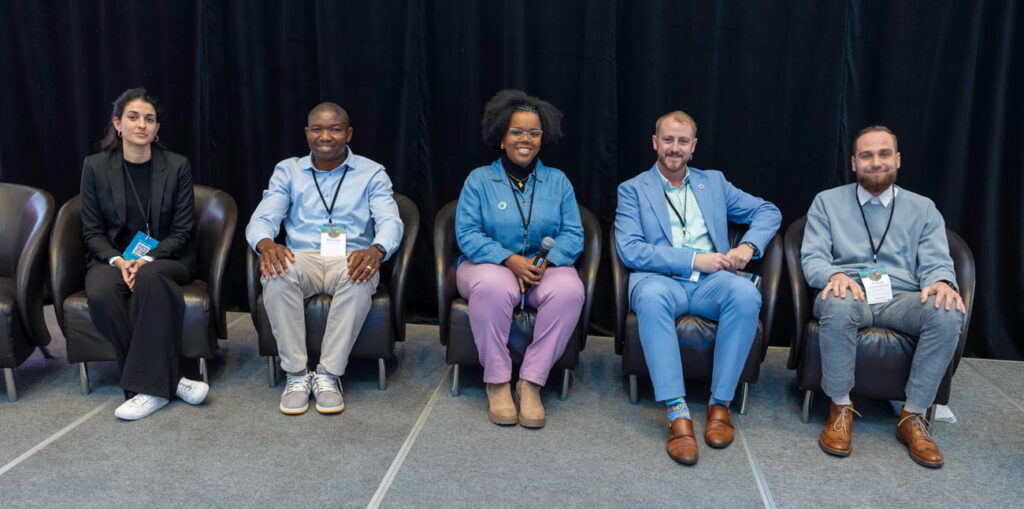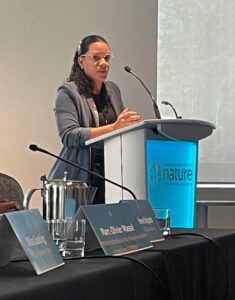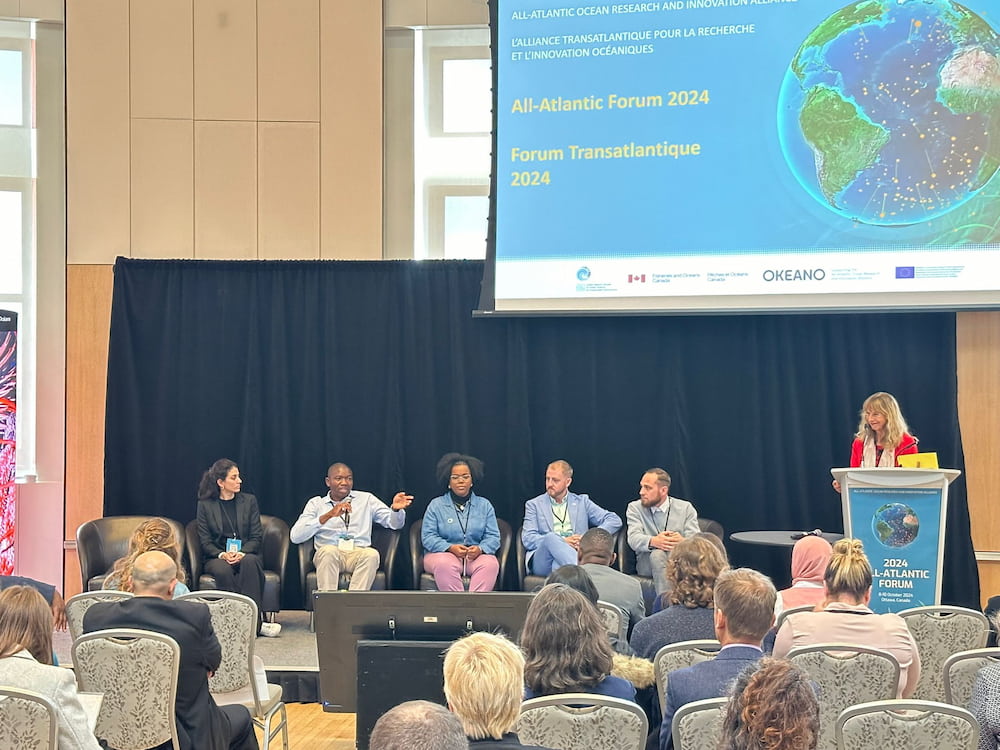Empowering Next-Gen Leadership: Participation of Early Career Ocean Professionals at the 2024 All-Atlantic Ocean Research and Innovation Alliance (AAORIA) Forum
Written by OceanBRIDGES ECOPs Blessing Charuka, Nikia Gooding, and Hind Azidane

7th October – Intergenerational Dialogue
The Intergenerational Dialogue was held on October 7th and was conducted in a hybrid format comprising groups of experienced researchers, policymakers, and Early Career Ocean Professionals (ECOPs) who spent the afternoon discussing how to address challenges and differing priorities along the Atlantic Ocean. The ECOPs were divided into groups, each focusing on a priority area: Coastal Resilience, Ocean Observation and Modeling, and Cross-Synergies among the two priorities. The discussions centered on fostering collaboration among ECOPs and senior industry experts to influence the future generation of leadership.
Participation of ECOPs
Funded by EU4OceanObs in the framework of OceanBRIDGES initiative, three ECOPs, Blessing Charuka, Nikia Gooding, and Hind Azidane, were among the Early Career Ocean Professionals who participated in this event. Collectively, ECOPs engaged in discussions on coastal resilience, and ocean observation and monitoring, and contributed perspectives on integrating local knowledge and scientific data. They also discussed leadership, diversity, equity, inclusivity, and the need for cross-generational knowledge exchange to advance ocean science and drive innovation.
Active participation from early career professionals encouraged the exchange of innovative ideas and perspectives on how science and the scientific community can enhance their contributions to policymaking and promote practical approaches to ocean stewardship.
The objective was to constructively engage with new ideas related to each priority area and develop policy briefs to address some of the challenges facing the Atlantic. Each proposal represented a potential project that could benefit future collaborations and innovative initiatives. During the discussions, the importance of delivering a policy brief report emerged as a priority, emphasizing the need to bridge the gap between research and practice by translating scientific knowledge into actionable insights.
The event was supported by the EU4OceanObs project and Geo-Blue Planet, enabling the participation of three Early Career Ocean Professionals (ECOPs) from South Africa, Trinidad and Tobago, and Morocco.
“I appreciated how everyone presented their ideas and how we collaboratively reached agreements in a flexible manner. Our coach skillfully guided us, leveraging her expertise as a policymaker to help us stay focused on our main goal,” said Hind Azidane, an ECOP from Ibn Tofail University in Morocco.
8 October – Side Events
 The Coastal Resilience: Toward an All-Atlantic Coastal Resilience Interface workshop was held on the morning of Tuesday 8th October, at the Canadian Museum of Nature, hosted by OKEANO. John Bell gave the opening remarks where he made a point – “climate tipping points are no longer in the future tense,” this statement framed some of the workshop’s discussions, where coastal resilience was charged with this daunting reality. Nikia Gooding was a panelist during the session that focused on case studies, from a local community point of view, where she spoke on her experience as a GIS professional working in the marine and coastal environment in Trinidad and Tobago. After this panel, each of the ECOPs would have led table discussions and assisted with rapporteuring to capture salient points, some of which focused on sustainability of coastal resilience projects across the Atlantic Basin.
The Coastal Resilience: Toward an All-Atlantic Coastal Resilience Interface workshop was held on the morning of Tuesday 8th October, at the Canadian Museum of Nature, hosted by OKEANO. John Bell gave the opening remarks where he made a point – “climate tipping points are no longer in the future tense,” this statement framed some of the workshop’s discussions, where coastal resilience was charged with this daunting reality. Nikia Gooding was a panelist during the session that focused on case studies, from a local community point of view, where she spoke on her experience as a GIS professional working in the marine and coastal environment in Trinidad and Tobago. After this panel, each of the ECOPs would have led table discussions and assisted with rapporteuring to capture salient points, some of which focused on sustainability of coastal resilience projects across the Atlantic Basin.
On the afternoon of the 8th October, ECOPs were invited to a local school in Ottawa, where students eagerly awaited our visit. We were warmly welcomed and divided into two groups, each joining a different classroom. The sessions began with students asking questions about our disciplines, and the discussions proved to be both challenging and insightful. The students inquired about career paths, how to choose the right courses based on their interests, the financial aspects of research, and which parts of the research process are the most engaging. The Q&A session was highly productive, and we truly enjoyed this unique opportunity for exchange and learning.

Key takeaways
- Need for real-time ocean data sharing to improve predictive climate models.
- Collaborative efforts between governments, NGOs, and researchers to support coastal resilience.
- Focus on equitable ocean governance and inclusivity.
9 October – Plenary Day 1
The official opening of the AAORIA Forum included plenaries and high-level panels on the future of Atlantic Ocean research, with the participation of the Government of Canada through the Fisheries and Oceans Canada, Ministers, and key stakeholders.
During the morning session, some of the speakers during their presentations shared their connections to the ocean, Ken Paul, a member of the Wolastoqey Nation at Neqotkuk, made a poignant point. He stated that “the ocean isn’t a thing we work on.” He then went on to explain, “It’s not the actions that we need for the ocean, that we want, because the ocean isn’t an object.” Rather, he spoke on reframing our perspectives towards the actions we need, for the ocean we need, as we work for the best interest on behalf of the ocean, and how much of a privilege that is. Mr. Paul’s address certainly helped to remind the audience of the importance and impact of the research, work and common interest that we are all involved in.
The ECOPs supported the organizers via moderating and active note-taking during sessions whilst contributing to the pitched and policy brief development. Nikia Gooding moderated the session on the showcase of selected Atlantic Basin projects, providing updates on ongoing programmatical research and projects. Plenary Day 1 of the Forum saw discussions on Blue Economy Innovation and the protection of marine ecosystems. The ECOPs contributed to conversations about sustainable economic opportunities in fisheries, aquaculture, and ocean energy, emphasizing the balance between development and conservation. They participated in breakout sessions on gender equality and diversity in ocean research, advocating for policies that support broader participation from underrepresented groups.
Key takeaways
- Balancing environmental protection with sustainable economic activities.
- Strategies for expanding the blue economy while protecting marine biodiversity.
- Encouraging gender diversity and equitable participation in marine science.
10 October – Plenary Day 2
The final day focused on collaborative actions for the future, with the closing plenary outlining key commitments from participating nations and organizations. The ECOPs continued their supporting roles on the final day as well. Blessing Charuka moderated the session on “Showcase of Selected Atlantic Basin Projects,” highlighting ongoing activities along the Atlantic.
The pitches from the Intergenerational Dialogue Event were presented by each of the ECOPs groups, followed by a short Q&A. The day reflected on the importance of continued transatlantic cooperation and the need to translate research outcomes into actionable policies. ECOPs proposed and discussed ideas for research and engagement, particularly with countries in the global South.
Key Takeaways
- Strengthening transatlantic partnerships for ocean sustainability.
- Translating research into policy for practical applications.
- ECOPs’ role in driving coastal resilience initiatives across the Atlantic Basin.
Conclusion
The ECOPs’ active participation in the 2024 AAORIA Forum provided valuable contributions to discussions on ocean modeling, coastal resilience, data sharing, and inclusivity in Atlantic Ocean research. Their involvement demonstrated the crucial role of early career professionals in shaping the future of cooperation and collaboration along the Atlantic Ocean.
More information
- Intergenerational Dialogue at the 2024 AAORIA Forum: Policy Briefs: https://allatlanticocean.org/all-atlantic-forums/2024-all-atlantic-forum-policy-briefs/





